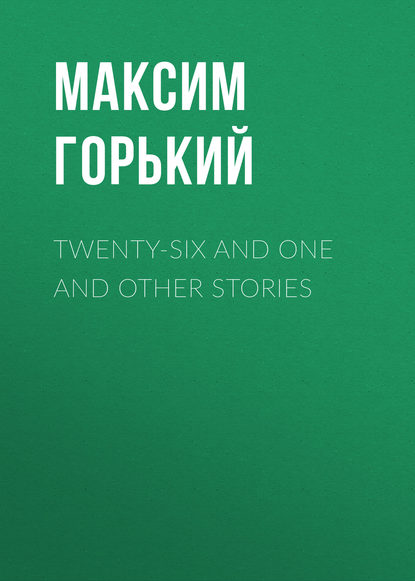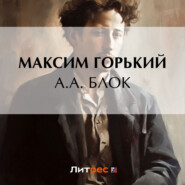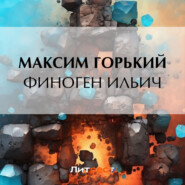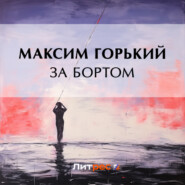По всем вопросам обращайтесь на: info@litportal.ru
(©) 2003-2025.
✖
Twenty-six and One and Other Stories
Настройки чтения
Размер шрифта
Высота строк
Поля
"Hey! Who calls?" was again asked. This time the voice was further away; Tchelkache felt relieved.
"It's you, yourself, friend, who calls!" said he, in the direction of the voice. Then, he turned to Gavrilo, who continued to murmur a prayer. "Yes, brother, you're in luck. If those devils had pursued us, it would have been the end of you. Do you hear? I'd have soon sent you to the fishes."
Now that Tchelkache again spoke quietly and even good-naturedly,
Gavrilo, still trembling with fear, begged him:
"Listen, let me go! In the name of Christ, let me go. Set me down somewhere. Oh dear! oh, dear! I'm lost! For God's sake, let me go. What do you want of me? I can't do this, I've never done anything like it. It's the first time, Lord! I'm lost! How did you manage, comrade, to get around me like this? Say? It's a sin, you make me lose my soul!.. Ah! what a piece of business!"
"What business?" sternly questioned Tchelkache. "Speak, what business do you mean?"
The lad's terror amused him; he also enjoyed the sensation of being able to provoke such fear.
"Dark transactions, brother.. Let me go, for the love of Heaven.
What am I to you? Friend."
"Be quiet! If I hadn't needed you, I shouldn't have brought you! Do you understand? Eh! Well, be quiet!"
"Oh, Lord!" sobbed Gavrilo.
"Enough!"
Gavrilo could no longer control himself and his breath came in broken and painful gasps; he wept and moved restlessly about on his seat, but rowed hard, in despair. The boat sped ahead like an arrow. Again the black hulls of the ships arose before them, and the boat, turning like a top in the narrow channels that separated them, was soon lost among them.
"Hey! You, listen: If anyone speaks to us, keep still, if you value your skin. Do you understand?"
"Alas!" hopelessly sighed Gavrilo, in response to this stern command, and he added: "It was my lot to be lost!"
"Stop howling!" whispered Tchelkache.
These words completely robbed Gavrilo of all understanding and he remained crushed under the chill presentiment of some misfortune. He mechanically dipped his oars and sending them back and forth through the water in an even and steady stroke did not lift his eyes again.
The slumbering murmur of the waves was gloomy and fearsome. Here is the harbor.. From behind its stone wall, comes the sound of human voices, the plashing of water, singing and shrill whistling."
"Stop!" whispered Tchelkache.
"Drop the oars! Lean your hands against the wall! Softly, devil!"
Gavrilo caught hold of the slippery stone and guided the boat along the wall. He advanced noiselessly, just grazing the slimy moss of the stone.
"Stop, give me the oars! Give them here! And your passport, where have you put it? In your bag! Give me the bag! Quicker!.. That, my friend, is so that you'll not run away.. Now I hold you. Without oars you could have made off just the same, but, without a passport you'll not dare. Wait! And remember that if you so much as breathe a word I'll catch you, even though at the bottom of the sea."
Suddenly, catching hold of something, Tchelkache rose in the air; he disappeared over the wall.
Gavrilo shuddered.. It had been so quickly done! He felt that the cursed weight and fear that he experienced in the presence of this moustached and lean bandit had, as it were, slipped off and rolled away from him. Could he escape, now? Breathing freely, he looked around him. On the left rose a black hull without masts, like an immense empty, deserted coffin. The waves beating against its sides awakened heavy echoes therein, resembling long-drawn sighs. On the right, stretched the damp wall of the quay, like a cold heavy serpent. Behind were visible black skeletons, and in front, in the space between the wall and the coffin, was the sea, silent and deserted, with black clouds hanging over it. These clouds were slowly advancing, their enormous, heavy masses, terrifying in the darkness, ready to crush man with their weight. All was cold, black and of evil omen. Gavrilo was afraid. This fear was greater than that imposed on him by Tchelkache; it clasped Gavrilo's breast in a tight embrace, squeezed him to a helpless mass and riveted him to the boat's bench.
Perfect silence reigned. Not a sound, save the sighs of the seas; it seemed as though this silence was about to be suddenly broken by some frightful, furious explosion of sound that would shake the sea to its depths, tear apart the dark masses of clouds floating over the sky and bury under the waves all those black craft. The clouds crawled over the sky as slowly and as wearily as before, but the sea gradually emerged from under them, and one might fancy, looking at the sky, that it was also a sea, but an angry sea overhanging a peaceful, sleeping one. The clouds resembled waves whose gray crests touched the earth; they resembled abysses hollowed by the wind between the waves and nascent billows not yet covered with the green foam of fury.
Gavrilo was oppressed by this dark calm and beauty; he realized that he desired his master's return. But he did not come! The time passed slowly, more slowly than crawled the clouds up in the sky.. And the length of time augmented the agony of the silence. But just now behind the wall, the plashing of water was heard, then a rustling, and something like a whisper. Gavrilo was half dead from fright.
"Hey, there! Are you asleep? Take this! Softly!" said Tchelkache's hoarse voice.
From the wall descended a solid, square, heavy object. Gavrilo put it in the boat, then another one like it. Across the wall stretched Tchelkache's long figure. The oars reappeared mysteriously, then Gavrilo's bag fell at his feet and Tchelkache out of breath seated himself at the tiller.
Gavrilo looked at him with a timid and glad smile.
"Are you tired?" said he.
"A little, naturally, simpleton! Row firm, with all your might. You have a pretty profit, brother! The affair is half done, now there only remains to pass unseen under the eyes of those devils, and then you'll receive your money and fly to your Machka.. You have a Machka, say, little one?"
"N-no!"
Gavrilo did not spare himself; his breast worked like a bellows and his arms like steel springs. The water foamed under the boat and the blue trail that followed in the wake of the stern had become wider. Gavrilo was bathed in perspiration, but he continued to row with all his strength. After twice experiencing the fright that he had on this night, he dreaded a repetition of it and had only one desire: to finish this accursed task as soon as possible, regain the land, and flee from this man before he should be killed by him or imprisoned on account of his misdeeds. He resolved not to speak to him, not to contradict him in anything, to execute all his commands and if he succeeded in freeing himself from him unmolested, to sing a Te Deum to Saint Nicholas. An earnest prayer was on his lips. But he controlled himself, puffed like a steamboat, and in silence cast furtive glances at Tchelkache.
The other, bending his long, lean body forward, like a bird poising for flight, gazed ahead into the darkness with his hawk's eyes. Turning his fierce, aquiline nose from side to side, he held the tiller with one hand and with the other tugged at his moustache which by a constant trembling betrayed the quiet smile on the thin lips. Tchelkache was pleased with his success, with himself and with this lad, whom he had terrified into becoming his slave. He enjoyed in advance to-morrow's feast and now he rejoiced in his strength and the subjection of this young, untried boy. He saw him toil; he took pity on him and tried to encourage him.
"Hey! Say there!" he asked softly. "Were you very much afraid?"
"It doesn't matter!" sighed Gavrilo, coughing.
"You needn't keep on rowing so hard. It's ended, now. There's only one more bad place to pass.. Rest yourself."
Gavrilo stopped docilely, wiped the perspiration from his face with the sleeve of his blouse and again dipped the oars in the water.
"That's right, row more gently. So that the water tells no tales. There's a channel to cross. Softly, softly. Here, brother, are serious people. They are quite capable of amusing themselves with a gun, They could raise a fine lump on your forehead before you'd have time to cry out."
The boat glided over the water almost without sound. Blue drops fell from the oars and when they touched the sea there flamed up for an instant a little blue spot. The night was growing darker and more silent. The sky no longer resembled a rough sea; the clouds extended over its surface, forming a thick, even curtain, hanging motionless above the ocean. The sea was calmer and blacker, its warm and salty odor was stronger and it did not appear as vast as before.
"Oh! if it would only rain!" murmured Tchelkache; "we would be hidden by a curtain."
On the right and left of the boat, the motionless, melancholy, black hulls of ships emerged from the equally black water. A light moved to and fro on one; someone was walking with a lantern. The sea, caressing their sides, seemed to dully implore them while they responded by a cold, rumbling echo, as though they were disputing and refusing to yield.
"The custom-house," whispered Tchelkache.
From the moment that he had ordered Gavrilo to row slowly, the lad had again experienced a feeling of feverish expectation. He leaned forward, toward the darkness and it seemed to him that he was growing larger; his bones and veins stretched painfully; his head, filled with one thought, ached; the skin on his back shivered and in his legs were pricking sensations as though small sharp, cold needles were being thrust into them. His eyes smarted from having gazed too long into the darkness out of which he expected to see someone rise up and cry out: "Stop thieves!"
When Tchelkache murmured: "the custom-house!" Gavrilo started: he was consumed by a sharp, burning thought; his nerves were wrought up to the highest pitch; he wanted to cry out, to call for help, he had already opened his mouth and straightened himself up on the seat. He thrust forward his chest, drew a long breath, and again opened his mouth; but suddenly, overcome by sharp fear, he closed his eyes and fell from his seat.
Ahead of the boat, far off on the horizon, an immense, flaming blue sword sprang up from the black water. It rose, cleaved the darkness; its blade flashed across the clouds and illumined the surface of the sea with a broad blue hand. In this luminous ray stood out the black, silent ships, hitherto invisible. It seemed as though they had been waiting at the bottom of the sea, whither they had been dragged by an irresistible tempest, and that now they arose in obedience to the sword of fire to which the sea had given birth. They had ascended to contemplate the sky and all that was above the water. The rigging clinging to the mast seemed like seaweed that had left the water with these black giants, covering them with their meshes. Then the wonderful blue sword again arose in the air, cleaved the night and descended in a different place. Again, on the spot where it rested, appeared the skeletons of ships until then invisible.
Tchelkache's boat stopped and rocked on the water as though hesitating. Gavrilo lay flat on the bottom of the boat, covering his face with his hands, and Tchelkache prodded him with his oar, hissing furiously, but quite low.
"Idiot, that's the custom-house cruiser. The electric lantern! Get up, row with all your might! They'll throw the light upon us! You'll ruin us, devil, both of us!"
When the sharp edge of the oar had been brought down once more, harder this time, on Gavrilo's back, he arose and, not daring to open his eyes, resumed his seat and feeling for the oars, sent the boat ahead.
"Softly, or I'll kill you! Softly! Imbecile, may the devil take you! What are you afraid of? Say? A lantern and a mirror. That's all! Softly with those oars, miserable wretch! They incline the mirror at will and light the sea to find out if any folks like us are roving over it. They're on the watch for smugglers. We're out of reach; they're too far away, now. Don't be afraid, boy, we're safe! Now, we.."

















